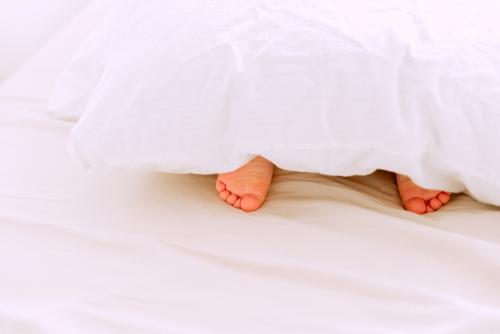Tips & Tricks That Will Help Your Family Get Better Sleep

The image source is Pexels.
Getting a full seven to eight hours of sleep is essential for people of all ages because a good night's sleep gives the body and brain time to heal. During the night, the brain produces and releases essential hormones, while the body heals tissue, muscle, and bone. Poor sleep also affects immunity, mental health, and cognitive functioning, making it even more vital to ensure everyone in your family is getting the sleep they need. These tips can help.
Provide Comfortable Bedding
If people in your household are having trouble sleeping, the problem may be their bedding. To begin, consider buying everyone a more modern style of bed, such as shopping for the best adjustable bed on the market. This would also be a good time to invest in new mattresses for everyone. Be sure each family member chooses a firmness that's right for them in picking out mattresses. To finish off the new bedding, by soft sheets, blankets, and comforters that help induce sleep. Good quality pillows are also essential to a full night of sleep.
Promote the Practice of Relaxation Techniques
You can also help your family sleep better by engaging them in relaxation practices just before bedtime. If you have small children, reading to them just before bed will help you and your kids relax together. Older family members can join you in meditation or yoga during the hour before bed. Other activities that your family members may find relaxing include taking warm baths, journal writing, listening to relaxing music, or working on a puzzle. The goal should be to ensure everyone is doing something that they find enjoyable and relaxing. This will give your body time to wind down, and engaging in relaxing activities each night will train your brain to begin preparing for sleep at this time.
Create the Right Environment
Finally, the sleeping environment in your home is also important to consider. When it's time for bed, you should adjust the thermostat to maintain a consistent temperature of 65 to 70 degrees in the bedrooms. It may also be a good idea to provide fans in each bedroom. If you live in an area close to major intersections, earmuffs or earplugs may help keep out the ambient noise as your family is trying to sleep. Eye masks can help keep out intrusive lighting that gets past the curtains or blinds on bedroom windows. It can also help to set up a charging station for phones in the kitchen or dining room to make sure no one is bringing their mobile devices to bed with them.
Control Caffeine Intake
When it comes to tips for better sleep, one of the first things to consider is your exposure to caffeine. Although you may not realize it, caffeine stays in your blood supply for several hours and builds up as you intake more of the stimulant. This is why doctors recommend having your last cup of coffee or soda at least six hours before you plan to go to bed. This will give the drug time to run its course. You can help your body expel the caffeine faster by drinking more water in the late afternoon and early evening. Drinking more water will flush toxins out of your body more efficiently, and it will help you keep your body hydrated.
Reset Your Circadian Rhythm
Your circadian rhythm is the scientific term for your body's biological clock and, among other functions, it's responsible for controlling wakefulness and sleepiness. The circadian rhythm is regulated by exposure to sunlight and darkness, but your lifestyle habits can interfere with this biological clock and cause you to feel wakeful and alert when you should be feeling sleepy. You can reset your circadian rhythm by getting more natural sunlight exposure during the day. In the evenings, spend a little time sitting under the stars or going for a walk. You should also stop using your mobile devices at least one hour before bedtime since the blue light these screens give off also disrupts the circadian rhythm.
Conclusion
If you have tried these tips and a family member is still having difficulty sleeping throughout the night, they should consult a doctor. The individual may need a prescription sleep medication or a natural supplement for inducing better sleep. Since prolonged sleep deprivation leads to a broad range of physical and mental health issues, it may be necessary to get professional help before the condition goes on for too long.
Post Your Ad Here
Comments